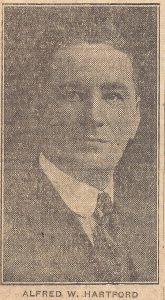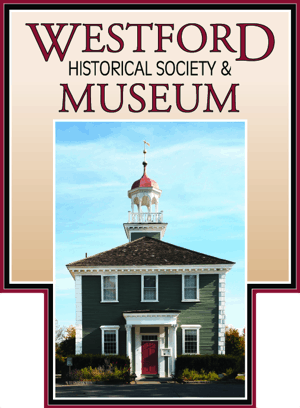Over the years, Westford has had many citizens who have made positive contributions to their community. George Hartford and his son Alfred were two of these people. During the early part of the 20th century, George and Alfred were both involved in town and civic affairs, and both served as state representatives in the Massachusetts House of Representatives. But most importantly, they were involved in numerous charitable and civic events in the town of Westford.
George Hartford was born in Newfield, Maine on March 3, 1852, but spent the early part of his life in Lowell, Massachusetts, He received his education in the Lowell public schools. Mr. Hartford spent the final forty-five years of his life in Westford. He was active in Westford politics as a member of the Republican Party and in 1904 was elected to the Massachusetts state legislature. In addition, he served 20 years as town assessor and for nine years on the Westford School Board. George was also a charter member of the Spalding Light Cavalry.
Massachusetts, He received his education in the Lowell public schools. Mr. Hartford spent the final forty-five years of his life in Westford. He was active in Westford politics as a member of the Republican Party and in 1904 was elected to the Massachusetts state legislature. In addition, he served 20 years as town assessor and for nine years on the Westford School Board. George was also a charter member of the Spalding Light Cavalry.
But the elder Hartford’s main occupation was that of farmer. In 1890, George Hartford owned 78 acres with his house located at what is now 23 Hartford Road off Patten Road near the site of the now Westford Academy. George owned dairy cows and each morning he put jugs of milk on a cart and took them to the Westford Depot to catch the 8:15 train to Lowell, where he would ship his milk. The round trip was approximately six miles. He would return in the evening to collect his empty jugs on the evening trains.
Always a good athlete, George set a world record by “running and laying one-half mile of hose “during a fireman’s muster while a member of the famous Torrent Veterans Fire Company in Lowell. The event held in Lynn, Massachusetts on September 25, 1875 featured Hartford carrying the fire hose the last one hundred yards for the Lowell company. The event that day featured sixteen other fire companies including the Edward M. Abbot hose company of Westford Center.
Mr. Hartford was known by his fellow town residents as someone who “filled every office with credit to himself and his fellowmen, using good judgment and keen intellect on all important questions.” These attributes were probably best illustrated when George was appointed jury foreman by Judge Dubuque in the 1919 high profiled capital murder trial in Lowell of Joseph Cordia and Francisco Feel for the murder of Louis Fred Soalis of Billerica. Cordia was acquitted of the crime, but Feel was convicted of first degree murder.
Another example of how Hartford was a fair man occurred in April 1904 when George was serving as state representative when a case was brought forth to the Ways and Means Committee on whether a man should receive an $ 800 annuity from the state for losing his eyesight during a knife assault while an inmate at the Concord Reformatory. The committee found records of the inmate Tommy Dixon being assaulted but could not find any record of Dixon being attacked by a knife. Representative Hartford spoke on behalf of Mr. Dixon.
George H. Hartford died on November 4, 1922, at the age of seventy. He was survived by his wife Elizabeth and nine children. At the time of his death there were many kind reminiscences for Mr. Hartford. One, from the Westford Wardsman may have summed up his contributions to the community best: “He was a fine man to meet, being of a cheerful disposition with a bright smile and a good word for everyone. One felt better for having known him.”
 Following in his father’s footsteps, Alfred W. Hartford also became active in political and civic affairs in Westford. During the early part of Alfred’s work life, he worked at the Wright and Fletcher’s store in Westford Center. He left this business after twenty-two years of consecutive service to enter the insurance business. Upon leaving Wright and Fletcher’s, Hartford was ““presented with a substantial cheque from the firm as a reward for faithful and efficient service”.
Following in his father’s footsteps, Alfred W. Hartford also became active in political and civic affairs in Westford. During the early part of Alfred’s work life, he worked at the Wright and Fletcher’s store in Westford Center. He left this business after twenty-two years of consecutive service to enter the insurance business. Upon leaving Wright and Fletcher’s, Hartford was ““presented with a substantial cheque from the firm as a reward for faithful and efficient service”.
But it was Alfred’s political and civic engagement that Hartford’s best remembered for in Westford. Like his father George, the younger Hartford was elected state representative in 1920. While serving as representative, he escorted Governor Channing Cox to a concert at the Frost School field. Alfred also served on the Westford Town Committee for twenty years and served as Town Moderator.
During and following World War I, Alfred was active in supporting the war effort and the soldiers who fought in it. On one occasion, he served on a committee that raised $103,150 in liberty loans in the town of Westford. The town’s goal was $75,000. Mr. Hartford and his committee went door-to-door to raise these funds. The town of Westford received an Honor Flag for these efforts.
Alfred also served on an entertainment committee that held military dances for soldiers in Westford and the surrounding areas. He was also a part of a committee that helped “secure a photograph of every local man in the United States service; also, the age of each soldier and date of enlistment with name of company.” The town of Westford kept these records at the town hall which would benefit veterans in future years.
The younger Hartford was also an avid sports fan and was involved in the Westford Athletic Association. In 1918, Alfred attended a World Series game between the Boston Red Sox and the Brooklyn (later known as the Brooklyn Dodgers) Robins played at Braves’ Field in Boston. Braves’ Field at the time was a larger and newer facility than the Red Sox home field Fenway Park.
He was also on the board of directors of the Westford Athletic Association which was responsible for scheduling and hiring a manager for the summer baseball games in Westford. Westford’s Athletic Association baseball team was one of the best baseball organizations in the area. The season would start on Memorial Day and run to the middle of September. Drawing on his experience, George was appointed manager of the baseball team in 1911.
In addition to all his activities and duties, Alfred was also a member of Troop F. Spalding Light Horse and served one year in the Massachusetts State Guard. Hartford served as a mess sergeant. During his time with the Massachusetts State Guard, Mr. Hartford took part in restoring order during the Boston Police Strike of 1919. This occurred when the Boston Police went on strike and riots and chaos broke out in the City of Boston. Governor Calvin Coolidge then called up the Massachusetts Militia to quell the riots and restore order. Alfred was part of the militia that went to Boston to end the disturbances in the city.
Alfred W. Hartford died at his Graniteville home on May 30, 1929, at the age of fifty-four. At the time of his death, he was survived by his wife and daughter Hazel. He served as town manager until the time of his passing. Westford is a better place for the contributions that Alfred and George made to the town and their community. (JVB 2/2023)
Sources:
Lowell Sun, “Tommy” Dixon,” April 26, 1904, p. 12.
Ibid. “Death of Well-Known Westford Man,” November 7, 1922, p. 6.
Ibid. “Former Representative Alfred William Hartford Prominent Westford Citizen Died Yesterday at Graniteville,” May 31, 1929, p. 28.
Ibid. December 31, 1919, p. 6.
Westford Eagle, “Westford Recollections, Gordon B. Seavey, January 25, 1979, p. 1.
Ibid, “Westford gallant men at Boston police strike in 1919, Gordon B. Seavey, August 16, 1979, p. 5.
Westford Wardsman, August 29, 1909, June 3, 1911, October 14, 1916, January 12, 1918, February 16, 1918, April 13, 1918, April 5, 1919, June 26, 1920, October 15, 1921, November 11, 1922.
